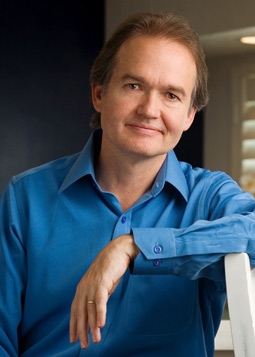
Can those of us alive today in the 21st century take a cue from our turn of the 20th century ancestors when it comes to sustaining solid marriages that don’t end in divorce, re-invigorating marital sexual relations, and even aiding in fertility? According to John Gray, PhD, relationships expert and author and creator of the Mars and Venus franchise, the answer is yes. In his newest book, Venus On Fire, Mars On Ice, author John Gray explains how our hormones, stress levels, and recent social and gender customs have collided to create the conflicts and health ills we see in present-day western relationships and marriages.
Men often wonder, “Why does she act so needy and moody when there is a problem?” Women complain, “Why is he so distant and quiet after a long day at work?”
And why are levels of infertility skyrocketing in women, while sexual virility is now rapidly declining in men as they reach middle age?
In this in-depth interview, best-selling relationships author John Gray, PhD discusses how modern life is wreaking havoc on our delicate hormonal balance, and how differentiating male and female hormones are largely responsible for feminine and masculine behavioral patterns that we observe in our partners, much to our frustration and misinterpretation.
Our lives are marred by fast-paced schedules and a barrage of technology, and gender roles are no longer clearly defined, but there are simple adjustments that can be made to re-balance male and female hormonal harmony. In doing so, stress levels can be kept in check as romantic feelings begin to re-blossom.
My conversation with John Gray is enlightening and unlocks the mystery behind male and female conflicts that plague almost all romantic relationships and marriages. This information is eye-opening and answers many of the questions married couples have been asking for years.
PR.com (Allison Kugel): Your new book, Venus On Fire, Mars On Ice, describes 100% the issues that I was having in my own relationship, and it has helped us quite a bit.
John Gray: Hooray!
PR.com: We have a fourteen month old. I don’t know if you have seen this pattern in the therapy that you do, but having a child accentuates the differences between men and women, tenfold.
John Gray: It magnifies it dramatically, and it makes you more dependent on each other. It brings up those issues.
PR.com: I particularly love the two page cartoon in the center of this book. It’s spot on! But what I didn’t know is, hormonally, men and women are actually wired to think and behave in different ways. I always believed it was just our preferences.
John Gray: It gets to the root of the matter, and then we can honor those differences because many of them are physiological. Some of them are preferences, some of them are simply temperaments. People are unique and different, but when you get down to the level of how we are coping with stress, this is a hardwiring that goes on in our bodies. We are naturally drawn to situations that help us cope with stress. And we assume our partner would be thinking and feeling the same way, when quite often it’s different. Then, that gives rise to misunderstanding. So the greater the stress in our lives, the more the differences [between men and women] will tend to show up.
PR.com: How did you come to these conclusions, regarding hormonal differences, in the way men and women express and diffuse their stress? And when did you first conduct the research for this book?
John Gray: Back in the early eighties is when I first started developing the ideas of Men Are From Mars, Women Are From Venus. Everybody kept saying, “Why? How do you know?” My answer in those years was, “I’ve got a counseling practice, and I’m married myself, and women almost all say the same things (laughs) about their husbands, and about themselves.” There were themes that are very universal in almost every household. When we are under stress is when these differences show up the most. When women are under stress their brains tend to speed up, and men’s tend to slow down. In the nineties when the book was very popular, that is when most of the universities began having gender studies departments. Brain scans were developed and every department had brain scans and you could start seeing how men’s and women’s brains reacted differently in situations. They would call me up and say, “What does this mean?” because I was a well known expert on gender. I continued to follow the miles of research, which has been done showing the differences between men and women. What I do is put it together in a coherent package to apply it in useful ways. No one has really done that. What inspired this book (Venus On Fire, Mars On Ice) is the research that was done at UCLA on oxytocin. It’s the hormone that lowers stress for women. In the nineties the drug companies discovered that oxytocin was not only the nurturing hormone, but was also the hormone responsible for women’s sexual response.
PR.com: So oxytocin is our version of testosterone.
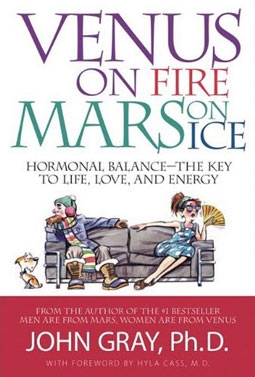
John Gray: That’s right. Estrogen is also a key thing for women. But estrogen doesn’t lower stress for women. It’s oxytocin. And estrogen doesn’t cause the sexual response. Estrogen is a very dominant female hormone, but if estrogen levels are out of balance and there is not enough estrogen, then the oxytocin is not as effective in lowering stress for women, so there is a relationship there. But to simply put it, testosterone is the hormone of sex for men, and oxytocin is the hormone of sex for women.
PR.com: Many people will be surprised by this information. I wasn’t aware of oxytocin. I thought in terms of estrogen and Progesterone. And I didn’t know that much of my behavior over the past year has been a desperate attempt to rebuild oxytocin. I also did not know that my partner has been in a frenzy to build his testosterone. We’re both playing out the script that is in your book. In fact, last night he said, “I had a rough day. I want to go unwind and watch a movie.” I had him go into a room and shut the door. I didn’t bother him, and he came out an hour later in a good mood.
John Gray: (Laughs.) Well done!
PR.com: What was going on in your personal and professional life when you wrote the original Men Are From Mars, Women Are From Venus?
John Gray: In my personal life, I had been married to Bonnie (Gray’s wife of twenty-five years) for seven years, we had a family and we lived very happily together. She had two little children from a previous marriage, and in our first year of marriage we had a child together, so we had three daughters. Professionally, I had been teaching about relationships for a good ten years and much of that time was teaching about the differences between man and women, and very successfully. People kept saying, “You have to write this in a book.” Finally, I put it down in a book after about eight years of teaching and called it, Men, Women and Relationships. That book did well, self-published. New York publishers then wanted to re-publish it so it could go national. I re-wrote it and used the original title that I wanted to begin with, which was Men Are From Mars, Women Are From Venus. Everybody thought it sounded too much like astrology, and nobody would publish it. Several companies declined because they didn’t want to use the title (laughs).
PR.com: And it’s such an iconic brand now. Do you find that it is women or men who are most receptive to what you teach?
John Gray: The receptivity is equal. When I went to Harper Collins and published Men Are From Mars they said, “Why don’t you [now] write primarily for women because mostly women buy these books.” I said, “No. I’m going to write it to men and to women because that is my message and men and women, equally, come to my seminars.” My message tends to be just as validating to men as it is to women. When the book first came out, it was primarily women who bought it. Within a few years men were buying as many [copies] as women, once word caught on that this book is very supportive of men as well as women. I think it’s probably one of the unique characteristics of the book. To this day, wherever I go, people say that the book saved their marriage. Sometimes people say, “We were divorced, and we got back together after one of us read the book.”
PR.com: What are your thoughts on traditional couples counseling, considering that it doesn’t seem to touch on their being a physiological reason why men have certain behavioral tendencies, and women have other behavioral tendencies?
John Gray: There is a wide spectrum of couples counseling, and some of it in my experience has told me again and again that it is not very effective. My kind of therapy that I was doing is primarily educational therapy, just educating people on the differences, and that they are quite capable of making their relationships work in many instances. There are some therapists who don’t have this insight, and they tend to just referee while having everyone talk. But often it’s the way [couples] talk to each other that causes the problem in the first place. What couples need is a greater understanding of where their partner is coming from. Sometimes, people don’t even know what their needs are. Essentially, if we really knew what we needed, it would be much easier to get it. I was just counseling a woman today and she is a very unhappy woman because her husband is emotionally unavailable, and not affectionate. The truth is [a woman’s] brain is eight times more active under stress than a man’s, in the emotional part of the brain. If you want him to become more sensitive, he needs to hear your feelings. But when a man opens up about his feelings a woman becomes even more concerned with upsetting him.
PR.com: Yes, that is true. I’ve experienced that.

John Gray: A lot of these ideas I put forth are very counter-therapy. Therapy, in many cases, has gone down the wrong road. It has tried to feminize men. Instead of feminizing men, what you do is you teach them what women need. Men are great problem solvers. They just need to know what to do. But to become like a woman is not the answer. Therapy is quite often biased in that way, in reinforcing the woman’s dissatisfaction in attempting to change a man and his nature, rather than using his nature to be most supportive of her.
PR.com: This may be an offensive question for some people, but do you think that the women’s movement over the past few decades has actually hindered male/female relationships and caused the divorce rate to rise?
John Gray: Oh, there’s no question in anybody’s mind that that is the case. I’m a feminist in terms of supporting women. I have three daughters and I want them all to go to college and have jobs, and live the life that they want to live. I have no issue with that aspect of feminism. But if you go back thirty years ago, it was very challenging for women to get the respect they deserved in the workplace. So they did the best they could, and they became like men in order to get that respect. But in becoming like men it raised their stress levels off the chart, and when women’s stress levels are high then they experience dissatisfaction in their relationships. That’s a reality that has happened to all of us. There are good things and not such good things that have happened from the feminist movement.
PR.com: Can you break the good and the bad down a bit further for clarification?
John Gray: The good thing is that women are, to a great extent, seen as equals in the workplace, and in the universities there are more women graduating than men. And more and more women are making as much, or more, than men. That is all a good thing in terms of equal opportunity. But the flip side is that in the process many women experience divorce or never got married, and they wonder, “Why am I not attractive to men?” and “Why am I never satisfied with the men that I’m in relationships with?” So there is a lot of confusion that came about. When you look historically at what the feminist movement really was, it’s like a massive cultural shift that has never occurred in a big civilization before. These roles that men and women have had, to various degrees, had pretty much stayed the same for thousands of years. Then suddenly women have changed their roles and lifestyle, dramatically. Then speed that up with computers, Internet and cell phones; our lifestyle is so much faster and busier than before. One of the key components for lowering stress for women is nurturing activities, rhythmic activities and non-urgency activities. Suddenly, our lives have become so fast that now women are seeking ways to cope with stress, and some are doing it more effectively than others.
PR.com: You talk in the book about the physiology of stress reduction for women, specifically…
John Gray: My book is to help women get underneath the surface and find out the physiology of what is really making them tick, how they can support themselves the best, and how their husbands can support them the best. If my wife says, “I want to go get a massage,” I know men that would say, “Well, honey, that’s expensive.” If my wife wants a massage, that’s as important as a doctor’s appointment (laughs). And if the guy says, “I need to spend a little alone time,” and you say, “Just go on and get out of here,” I mean, what a brilliant thing! Very few women have that insight, so he’ll end up feeling guilty. If a guy feels guilty for taking time away, or if he just doesn’t take time away, then gradually his testosterone levels get lower and lower and his interest in the relationship becomes less and less.
PR.com: I’ll admit I was making that mistake.
John Gray: Every woman does. How can you not if you feel that [men and women] are the same? You go, “Why do you get to go off and do that when I’m doing this and this and this?” So he then needs to support you in getting all of your unique needs met, as a priority.
PR.com: Like you say in the book, when a woman goes off to get a massage, for example, it is to escape all of her responsibilities.
John Gray: Right, and on the surface that would sound very thin to some people, unless you measure and see that during a massage her oxytocin levels rebuild, and then she is able to cope with stress. It’s not like you’re going to just lock yourself up in a room and get away. That’s what a man can do, but a woman needs to have some nurturing support which allows her brain to relax.
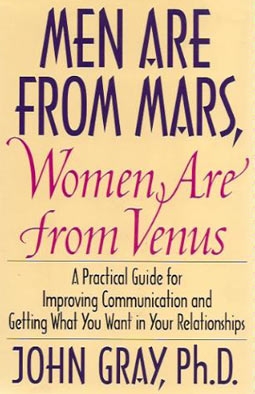
PR.com: You hold all of this knowledge, but in your own marriage do you and your wife ever slip into some of the bad patterns that most others do?
John Gray: Yes and no. I’ll still forget to do stuff, but my wife just simply asks me to do it again. I guess my answer to this is we would not be together, and we are very happily married and we are very happy together, if we didn’t have this knowledge. Part of what this knowledge does is it creates room for me to be a guy and for her to be a woman. I take my cave time and she takes time to talk about things. Just today my wife was having a strong reaction about [something], and because I know Mars/Venus I won’t say much (laughs). I’ll just nod and not say anything to be dismissive of the whole thing. Most guys would take charge and say, “This is what we need to do.” But there has to be some time for her to vent.
PR.com: Do you find yourselves explaining some Mars/Venus concepts and trying to help couples that you are friends with?
John Gray: Yeah, all of my friends love to go on walks with me (laughs). My friend is engaged to this woman and they’re having some difficulties. He talked to all his friends and everyone told him to end it. He asked if he could talk to me, but I said, “Do so at your own risk because you’ll end up wanting to get back involved in this relationship.”
PR.com: Is that what happened?
John Gray: Yes, he did (laughs). He said, “Darn you, John Gray. You did it again!” I helped him see her point of view, and I helped him see how he created the mess. Most people don’t understand. Your friend is having a problem with their spouse, and you listen to them and empathize with them, but most people don’t understand that your friend also has a part in that process. If people aren’t reminded of how they continually create the problems that they experience in life, then they feel victimized, and of course the love stops flowing and they want to end the relationship. We don’t have to change our partners much. We just need to know what their needs are, and to realize how we have sabotaged the situation.
PR.com: Do you think the notion of a woman being a guy’s girl, or a man being a girl’s guy, do you think that is a myth?
John Gray: I don’t see it as a problem at all when women relate to men more than women. Where it can be a problem is where women deny their feminine side, and see it as a form of weakness. That’s a common phenomena, and that is a problem for relationships. It’s hard for her to open up and be vulnerable. It’s hard for her to acknowledge aspects of who she is because she [fears] she will be judged or ridiculed. In some cases, that denial of femininity shows up as liking to hang out with guys. But it can also show up as liking to hang out with girlfriends, and she just tends to find girlfriends that are also quite shut down to their femininity. Guys who like to hang out with girls and have lots of girl friends, typically there are two categories. There’s the guy who just likes girls and also has male friends. But there is another guy who hangs out with girls because they listen to him talk about his feelings, and he’ll say guys don’t relate to it or like it at all. This guy has a problem because guys won’t want to hang out with him, and girls will be like friends to him, but they are never going to want to have a relationship with him. You won’t feel an attraction to him if you’re a woman, if a guy is too much like a girl.
PR.com: I can’t speak for men. But speaking as a woman, when I read in your book how women really need that female bonding and camaraderie, and how they spent all day bonding with other women many decades ago, I was picturing an old fashioned sewing circle.
John Gray: That’s exactly right.
PR.com: In today’s world many women, myself included, feel that other women can be petty or competitive. We don’t seem to be able to enjoy that same female camaraderie that women did decades ago, like at the turn of the twentieth century.
John Gray: It is missing and it needs to be created more and more. Women’s support groups, as an example, are a great thing to have. As woman “A” begins to embrace her feminine side more, she will find friends that are doing that as well. And one will tend to be repelled from the women that are becoming like men. I’m going to a men’s group meeting tonight. I have two different men’s groups that I am a part of. It’s kind of like in the old days when men had their smoking or drinking clubs. It was men hanging out. We just hang out and we update each other on our lives. My wife has two women’s groups as well as a host of female friends. It’s really important for women, more so than for men, to have female friends. Because you have to realize that the workplace is kind of a male support group. It reinforces all of the testosterone values.
PR.com: How can a couple break the cycle where anger and resentment builds up, so their sex life dies, and the lack of sex creates further tension and drives them further apart? How do they find their way back to each other under these circumstances?
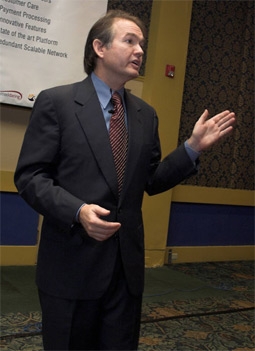
John Gray: It’s a common pattern. What’s the number one characteristic that couples experience when they are in love? They experience sexual attraction. When the sexual attraction is gone it is really hard to stay in a relationship today. A while back everybody was asking me why Tipper Gore and Al Gore would get a divorce. And I don’t know them, but they’d been married forty years. They are busy working all the time and not together, and I am sure one of them just got turned on for the first time in twenty years (laughs).
PR.com: (Laughs.) To someone else…
John Gray: To someone else, yeah. You mentioned that for some couples when the sex drive goes away there is anger about that, but for some couples there is actually a peacefulness that sets in when the sex drive is gone. There is a middle ground where one isn’t interested and the other one is, and there is anger that there is no reciprocation. It all comes back down to the hormones of passion. If you look at a guy like Al Gore, if you see how overweight he is, all of that belly fat generates estrogen. Estrogen suppresses testosterone. So men with these big bellies lose their sexual desire. Their passion is just gone. Yet, if they meet someone new and different it is easy to get it back temporarily, because new and different is a lot of challenge which stimulates dopamine, which in turn stimulates testosterone. It makes you feel alive. I’m sure they cared enough about each other to say, “Just go off and be happy.” Or it could have been the other way around. I hear all these stories of women in their sixties who get awakened and they go, “Gee, I want something, and I just don’t have it with my partner.” When couples are getting divorced they find reasons why they’re getting divorced, but the bottom line is they’re not having sex. On a certain level, when a guy stops having sex or when he doesn’t want sex, he doesn’t want it, so he doesn’t miss it. It’s hard to identify that as a problem, but then it becomes a problem when you want to have sex with someone else.
PR.com: What creates that disinterest as time goes on?
John Gray: It’s all locked up inside. It gets locked up and you can’t access it with your partner if your testosterone levels start dropping. You saw in the book, the statistics are just terrible with this. A man’s testosterone levels at forty years old are the same as a seventy year old man just thirty years ago.
PR.com: That blew me away.
John Gray: It’s blowing everybody away. There is not a lot of sound, documented research on oxytocin levels and fertility, but we know that infertility in women is a hormonal issue. Nobody has done that study yet, but I’ve done it in my own anecdotal research. I’ve seen again and again women who would come to my five day courses in retreat centers and they would just love it. It’s kind of like being on a cruise, but doing personal growth work and talking and sharing a lot. It was all of these oxytocin stimulating activities like massage and spas. Then women would write to me and say, “I’m pregnant now!” They got pregnant because they were relaxed and their oxytocin levels were there, and their body could respond. As oxytocin levels have dropped we have a massive drop in fertility in women. One out of three women today has challenges with fertility.
PR.com: I’ve heard a lot of these stories from women I know; young women in their twenties and early thirties. Do you think loss of passion in relationships is mainly physiological and hormonal, or is it emotional and anger-related?
John Gray: Both things are going on simultaneously. Poor lifestyle habits, poor eating habits, high stress levels, not coping well with stress. I just dealt with a whole bunch of couples like that this weekend. I got them opening up and sharing feelings at a deeper level than they knew they had. Suddenly those feelings come back. In the movies it happens because there is some sort of life and death situation; some intense situation and then there are all of these romantic feelings. But daily life doesn’t let us access those kinds of intense feelings. So there is a numbness that sets in. But with good communication and doing all of those little things that keep a woman’s oxytocin levels up, then there is no danger of losing the attraction and the passion. My wife and I have been together for thirty years, and we’ve been married twenty-five years. We don’t have as much sex as when we were dating (laughs), but we have sex a couple of times a week and it’s fantastic. Sometimes I’m away for a week and when I come back it’s really fantastic.
PR.com: Even when your kids were really little?
John Gray: No. When the kids were little we didn’t have that much sex. Easily a week could slip by and you kind of went, “What happened there?” What happens is it is so easy to get out of the routine, and out of the habit of it. That’s why I’ve written this book and put a big emphasis on the sex part of it. If you don’t say, “This is important for my health,” then you kind of go, “I’ll just have sex when I feel like it,” as opposed to creating a schedule where it would happen. When the kids were little I told Bonnie, “Every Monday, that’s your day off. You go away; I’m taking care of everything. You just go away for a day and do things that you love to do, and if you want you can give me a call, and I’ll get a babysitter and come visit you at a hotel room.”
PR.com: Oh wow, I like that idea!
John Gray: It was a very sweet time of our lives and I remember it very clearly. I would be thinking, “Is she going to call, or is she not going to call?”
PR.com: A little mystery.
John Gray: A little mystery, that’s right.
PR.com: In this book you state that each of us is responsible for 90% of our own happiness, and only 10% should come from a significant other. What do you mean by that?
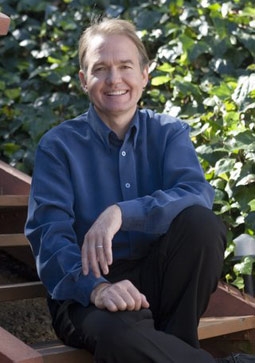
John Gray: The idea first came into my consciousness many years ago. A Feminist wrote a book called, Men Are Just Desserts. She did it in a condescending way, but the irony is, as a man, I was complimented by it. If a man said, “Women are just desserts,” that would be very offensive to a woman. To me it’s not offensive at all. Men intuitively understand that. We want to be the whip cream. We want to be the add-on. We don’t want to do it all. When my wife would take responsibility for her happiness, and then ask me to do something [for her], then she would become happier, and I would take credit for the whole thing. That was good for me and it was good for her. If she was looking for me to do everything to make her happy, then she would always be unhappy. She learned to create a life where she has friends, and she has rhythm and she has routine, so she is basically very happy. She then allows me to take her from happy to happier; from feeling good to feeling great. I noticed where she shifted and was consciously doing that. It suddenly gave me more interest in her, it made me more motivated. If you’re just about to win something then naturally you’re going to take the next step. But if you feel like it’s thirty steps and you still don’t know if you are ever going to get there, you just get tired. Ideally, what relationships are built upon is a sense of fulfillment within yourself, and here is someone who I can share myself with and add to them as they add to me. Not someone who is going to take me from zero to one hundred. I’m happy to take my wife from ninety to one hundred. My job’s much easier then.
PR.com: Sometimes relationships can cause us to regress and lean back on our partner with a little too much weight.
John Gray: Well, if you go to indigenous cultures, for example, women are rarely upset with their husbands the way that in the West we are. They don’t expect their husband to do it all. Their life does it. It’s like when we were talking about women’s circles and women in the garden or women in the community doing what they do. That was most of their day, and that is what brought them their fulfillment and then the guy was whip cream. He would protect them and he would help fix things when they break, and he was kind of the “emergency man (a term Gray refers to in his book).” Very little more was expected of him. That is the formula for healthy relationships. We don’t look to one person for everything. We have to have a life that is rich in different types of support. Then our most special support is our intimate relationship.
John Gray’s seventeenth book, “Venus On Fire, Mars On Ice” is currently in bookstores nationwide, including Barnes & Noble, and available at Amazon.com – book and PBS Special DVD combo. You can also visit VenusOnFireMarsOnIce.com.
